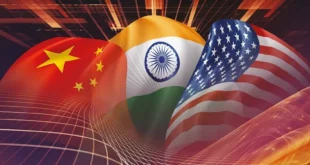Washington and Beijing shared one fundamental goal for Monday night’s virtual meeting between Chinese leader Xi Jinping and U.S. President Joe Biden: to bring a modicum of stability to U.S.-China relations. The meeting, which ran 3 1/2 hours, was described as “intense and engaged.”
“It seems to me our responsibility as leaders of China and the United States is to ensure that the competition between our countries does not veer into conflict, whether intended or unintended,” Mr. Biden told Mr. Xi as the meeting was starting. “Just simple, straightforward competition.”
Mr. Xi struck a similar emphasis in the meeting – the first face-to-face discussions between the two men since President Biden took office. “The most important event in international relations in the coming 50 years will be for China and the U.S. to find the right way to get along,” the Chinese leader told Mr. Biden.
Indeed, experts agree that Monday’s session, a respectful and open conversation between the two leaders, put the critical relationship on the more solid footing it badly needs.
“The U.S.-China relationship was effectively dysfunctional. … It was confrontation through public condemnation,” said Ryan Hass at the Brookings Institution. The talks “put a bit of a floor underneath the relationship.”
One year ago, with the globe reeling from a pandemic, the United States and China not only failed to cooperate to combat the crisis but also unleashed a level of discord not seen for half a century, at one point triggering fears of war.
Indeed, in late October 2020, Gen. Mark Milley, chairman of the Joint Chiefs of Staff, felt compelled to call his Chinese military counterpart, Gen. Li Zuocheng, to convey a message that the U.S. was not going to attack, General Milley testified in September.
With this backdrop, Washington and Beijing shared one fundamental goal for Monday night’s virtual meeting between Chinese leader Xi Jinping and U.S. President Joe Biden: to bring a modicum of stability to U.S.-China relations in a bid to prevent further deterioration and risk.
“It seems to me our responsibility as leaders of China and the United States is to ensure that the competition between our countries does not veer into conflict, whether intended or unintended,” Mr. Biden told Mr. Xi in remarks from the Roosevelt Room in the White House as the meeting was starting. “Just simple, straightforward competition.”
Mr. Xi struck a similar emphasis in the meeting – the first face-to-face discussions between the two men since President Biden took office.
“A sound and stable China-U.S. relationship is required for advancing the two countries’ respective development and for safeguarding a peaceful and stable international environment,” the Chinese leader told Mr. Biden. “The most important event in international relations in the coming 50 years will be for China and the U.S. to find the right way to get along.”
Indeed, experts agree that Monday’s session, a respectful and open conversation between the two leaders, put the critical relationship on the more solid footing it badly needs.
“The U.S.-China relationship was effectively dysfunctional. … It was confrontation through public condemnation,” said Ryan Hass, senior fellow at the John L. Thornton China Center at the Brookings Institution.
The leadership talks “put a bit of a floor underneath the relationship,” offering stability and stopping a runaway escalation of conflict that is not in the interests of either side, he said in a Brookings panel discussion Tuesday about the talks.
A shared responsibility
The tone of the lengthy meeting, which ran overtime to last about 3 1/2 hours, was “intense and engaged,” a senior U.S. official said afterward, reflecting how well the two leaders know one another, having spent many hours talking, traveling, and gaining familiarity over the years.
Mr. Xi referred to Mr. Biden as an “old friend,” and the two traded stories and referred to past conversations in a meeting that was at times unscripted, national security adviser Jake Sullivan said at the Brookings session. “It’s not just reading off talking points. There is actually a genuine give-and-take,” he said.
“They both recognize the weight of the relationship and stewarding the relationship … and they are looking to shoulder that weight responsibly,” Mr. Sullivan said.
Both leaders pledged to continue their meetings. Going forward, Mr. Hass said, this would appear to establish a new pattern, where the leaders meet to identify key issues, empower senior officials to follow up, and then meet again to push things forward.
“The U.S. and China seem to be making strides” in closing the gaps in expectations, he said. “It doesn’t solve the problems that are embedded in the relationship, but it makes it more manageable.”
Both leaders used the meeting to air disagreements and to highlight areas of highest danger for the relationship, according to officials on each side.
President Biden cited China’s human rights abuses, specifically referring to treatment of the Muslim Uyghur population of Xinjiang province – a situation Secretary of State Antony Blinken, present at Monday’s meeting, has labeled “genocide.” He also spoke of China’s “unfair trade and economic policies,” senior officials said.
For his part, Mr. Xi condemned advancing U.S. military cooperation with China’s neighbors – presumably a reference to the Biden administration’s stepped-up cooperation with the “Quad” countries of Australia, India, and Japan – saying such bloc-building would “inevitably bring disaster to the world.”
U.S. balancing act
A surprise climate accord announced between the two powers last week had raised hopes among some advocates that Monday night’s talks could result in additional breakthroughs.
But the virtual meeting was more about “setting the guardrails” for the intense competition between the two countries, rather than any concrete actions or “deliverables,” a senior administration official said after the meeting.
Moreover, the distance between their respective top priorities – Mr. Biden focused on China’s rising threats against Taiwan, according to officials, while Mr. Xi wanted progress on lifting tariffs on Chinese goods imposed under the Trump administration – suggested that cooperation is likely to be more the exception than the rule in coming years.
The U.S. president did not end up offering any of the tariff relief the Chinese leader sought.
Indeed, the Biden administration’s rhetoric on China suggests the delicate balancing act the administration is executing when it comes to the world’s most consequential big-power relationship.
On the one hand, Mr. Biden’s frequent references to “intense competition” with China and tough talk on China’s human rights abuses and authoritarian model of governance reflect the president’s vision of China as a rising 21st-century challenge.
“The use of the term ‘competition’ by the administration is not a political tactic” to respond to Republican critics, says David Shambaugh, director of the China program at George Washington University’s Elliott School of International Affairs, commenting in an email. “It is an intellectual and policy construct of how the U.S. frames the relationship.”
At the same time, the almost automatic add-on calls for “cooperation” when possible and in the interest of both parties suggest a pragmatic realism toward China.
This “on the other hand” view recognizes that China – as the world’s second-largest economy, with trade and investment ties with key strategic regions of the world that often surpass those of the U.S., and with a rapidly expanding military and growing nuclear arsenal – requires deft and realistic engagement.
Need for “new mechanisms”
From the perspective of some China experts and some officials within the administration, that means the U.S. cannot deal with China the same way President Ronald Reagan approached a failing Soviet Union in the 1980s, as some new Cold War theorists would advocate.
“We have the internet now, our supply chains are significantly intertwined, it’s a deeply different environment from that of the Cold War, so we can’t address the challenges China poses today by turning to the past for responses,” says Emily de la Bruyère, a senior fellow in the China program at the Foundation for the Defense of Democracies in Washington.
“We need to come up with new mechanisms to deal with a new situation.”
From the perspective of China’s domestic politics, Mr. Xi seeks to demonstrate he can manage the U.S. relationship as a crucial Communist Party meeting approaches in late 2022, when he intends to secure a rare third term as China’s top leader, experts say.
“Xi doesn’t want the possibility a war will break out or the U.S. will radically ramp up sanctions or put more Chinese companies on the entity list,” says Scott Kennedy, a senior adviser and expert on China’s economic policy at the Center for Strategic and International Relations. Instead, Beijing “wants to stabilize things where they are,” he says.
 Eurasia Press & News
Eurasia Press & News



